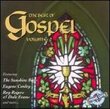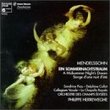| All Artists: Alexander Paley Title: Weber: Piano Music, Vol. 4 Members Wishing: 0 Total Copies: 0 Label: Naxos Release Date: 7/29/2009 Genres: Special Interest, Pop, Classical Styles: Easy Listening, Forms & Genres, Fantasies, Rondos, Short Forms, Sonatas, Historical Periods, Romantic (c.1820-1910) Number of Discs: 1 SwapaCD Credits: 1 UPC: 730099400626 |
Search - Alexander Paley :: Weber: Piano Music, Vol. 4
 | Alexander Paley Weber: Piano Music, Vol. 4 Genres: Special Interest, Pop, Classical
WEBER: Piano Music, Vol. 4 by Alexander Paley |
Larger Image |
CD DetailsSynopsis
Album Description WEBER: Piano Music, Vol. 4 by Alexander Paley Similar CDs
|
CD Reviews"I do not care to expose my inmost soul to the public, and t Hexameron | 05/23/2007 (5 out of 5 stars) "These are the words of Carl Tausig, if we are to believe Wilhelm von Lenz's account when he met the great artist. Lenz seemed a great disseminator of Weber's piano music, introducing it to Liszt and Chopin, for instance. Tausig was familiar with some of Weber's famous concert pieces but even if his words were paraphrased (which they must have been), Tausig would seem to know the Sonatas, too. His declaration of what Weber "demands" is fascinating, but if we consider this present recording, it's certainly agreeable. This is the last volume in Naxos's survey of Weber's piano music, and it's an exciting finale to the series.
Up first is Weber's wonderfully expressive but somewhat deceptive Fourth Sonata in E minor. As this is the last Piano Sonata Weber wrote, we might expect a ravishing and sublime testament, like the last Sonata of Beethoven or Schubert. In a sense, we get a strange "programme" work. According to the liner-notes, "the composition is a picture of melancholy and despondency, which runs through all the psychological stages of hope and despair, culminating at last in mental and physical exhaustion and death." The first movement, with its echoes of contemplative sorrow and desperate struggle would surely support such a description. The Menuetto seems serious at first, but gradually gets more playful, especially in the trio, which bolsters the idea that hope and despair are in battle. The Andante is rather ambiguous in mood: gentle, lyrical, and then tempestuous. Oddly, the Sonata ends with a virtuosic Tarantella that suggests neither victory nor death by the time of its conclusion. On the whole, this Sonata is a mysterious one. Whatever the "programme" is it's impossible to say. Despite that, the work exhibits Weber's typical melodious themes, Beethovenian development sections, and a wealth of expressive content. Alexander Paley is always inspired and his interpretation is never wanting. Naxos has continuously inserted sets of Variations into each volume, so it is no surprise to see some Variations here. Weber's Seven Variations on Mehul's "Joseph" opera is quite grand. I would say it's the most memorable and inventive as well. Weber unleashes a glorious sequence of reworkings of Mehul's theme. Gorgeous harmonies, beautiful introspections, delightful dances, intense brooding; it's all here. Probably the most surprising and true jewel on this recording, though, is Weber's "Les Adieux" Op. 81. Yes, the identical opus number with Beethoven's own Les Adieux Sonata can't be just a coincidence. The liner-notes suggest this is a publisher's "practical joke." Regardless, this music is stunningly beautiful, full of emotional depth and real angst. To finish this lovely recording off, Paley ignites the keys with Weber's Rondo brillante and Polacca brillante. The Rondo is just a light-hearted pleasure, with unexpected mood swings and virtuosic ornamentation. The Polacca is apparently Mendelssohn's "favorite solo piano piece which he played almost in preference to all his own compositions," and it's a sheer delight. Despite the composition's understated technical demands, Weber reveals some of his most infectious phrases here; I've had a hard time expelling these from my head, they're so catchy. Bottom line: Naxos and Paley have given us a magnificent survey of Weber's piano music. The consistent quality of music content and the certifiably excellent performances by Paley have led me to give each of the four volumes here five stars. Although these four volumes are out of print, I encourage the curious to buy them used as soon as they are available. Weber needs to be appreciated for more than Der Freischutz." |

 Track Listings (8) - Disc #1
Track Listings (8) - Disc #1






